
- Screenshot
- The Register's website
Burlington High School principal Noel Green may have violated state law when he ordered student journalists to take down a story posted to the school newspaper’s website.
Monday night the
Register broke the news that the state has been investigating school guidance director Mario Macias,
who is accused of unprofessional conduct and could lose his educator's license for nearly a year.
By Tuesday morning, Green ordered the
Register’s teacher adviser, Beth Fialko Casey, to pull the article. Fialko Casey conferred with the article’s four authors — editors Julia Shannon-Grillo, Halle Newman, Nataleigh Noble and Jenna Peterson — who reluctantly agreed to comply.
“It did cross our minds that they’d want to talk to us and we were ready to defend our actions but we were not expecting it to be censored,” said Shannon-Grillo, a 16-year-old junior. “We understand [Green’s] decision, but as editors, we don’t agree with it.”
By Tuesday afternoon, several local media outlets, including
Seven Days, had confirmed and reported on the story the
Register broke. The student newspaper’s article, meanwhile, had been
replaced with a blank page and the headline: “This article has been censored by Burlington High School administration.”
“In my opinion, [the article] created a hostile work environment for one of my employees,” Green told
Seven Days on Tuesday. “I would react the same way for any of my employees.”
Green’s order to pull the story appears to be in direct conflict with a law signed in May 2017 that was meant to protect student journalists from administrative meddling. For any decision to censor,
Act 49 maintains that school administrators must provide “lawful justification without undue delay.”
“Content shall not be suppressed solely because it involves political or controversial subject matter, or is critical of the school or its administration,” the law reads. Certain information is not protected, including libelous and slanderous material, and stories deemed an "unwarranted invasion of privacy."
“I think the students have a very strong case that their rights are being violated,” said state Sen. Phil Baruth (D/P-Chittenden), who helped shepherd the legislation through as chair of the Senate Education Committee. “I think the principal, with a little bit of time to reflect, would do well to put the article back up.”
Shannon-Grillo said she and the other student journalists spent Tuesday morning calling local law firms and representatives from the Student Press Law Center to get clarification about their legal rights. When they couldn’t get in touch with anyone, they agreed to temporarily pull the story. They worried Green would discipline Fialko Casey.
“We didn’t see why it needed to be taken down,” Shannon-Grillo said. “It was public information.”
What they didn’t know at the time was that Act 49 also protects newspaper advisers from discipline when they take “reasonable and appropriate action to protect a student journalist for engaging in conduct protected” by the law.
Fialko Casey is familiar with Act 49. Student journalists at Burlington High School, who had been subject to strict administrative editorial oversight, had helped get it enacted. Fialko Casey and then-student editors posed for photos with Gov. Phil Scott in May 2017 as he signed the bill into law.
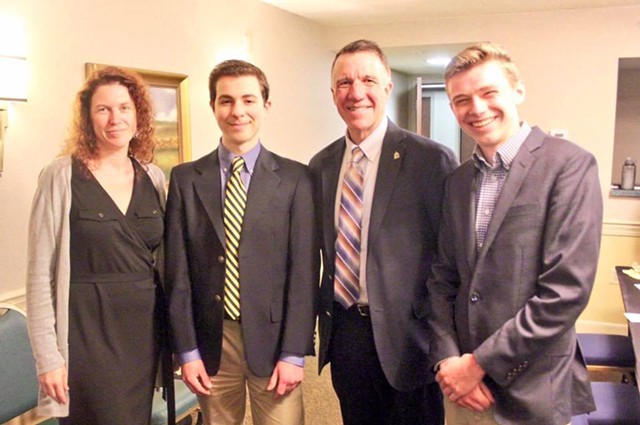
- Courtesy of BHS Register
- Beth Fialko Casey, Alexandre Silberman, Gov. Phil Scott and Jake Bucci
In this instance, Fialko Casey said, she left it up to the students to decide whether to comply with Green’s order or not. While she knew about protections provided by the law, she didn’t know what repercussions she or the students would face if they refused to listen to the principal. She said she promised to support the students in whatever decision they made.
“I’m just a mentor,” Fialko Casey said. “They have control of the paper and can take or leave my advice. I’m not the editor. It’s not my newspaper.”
After taking the story down, Fialko Casey met with Green for 70 minutes. The two argued and debated the censorship and left the meeting still in disagreement. Fialko Casey said Green had a copy of Act 49 in front of him. She said he felt his decision to pull the article was in keeping with the law.
“Unfortunately, the censorship stood,” Fialko Casey said. “He would not let us put it back up, so we did not win the battle but we live to fight another day.”
Shannon-Grillo said Wednesday that the students were still weighing whether to proceed with a legal case. First, they’ve invited Green to their class Friday for a discussion on ethics and “so we understand his side of this.”
Green did not respond to a request for comment Wednesday, nor did Macias or Superintendent Yaw Obeng.
“I would say, to a T, this is exactly why we wrote the bill,” Baruth said. “Because the default posture of any power structure is, frankly, to cover its own ass. Student journalists at BHS have broken a number of stories and they should be rewarded for that. They should be receiving accolades rather than having their work taken down in a kind of knee-jerk, defensive reaction.”
If it’s any consolation, the censorship has attracted
more attention to the story — and the issue. “It’s been one of the most intense weeks of our lives and a complete whirlwind of events,” Shannon-Grillo said. The outpouring of support from fellow students, teachers and parents, “has been extremely rewarding,” she said.
“We feel like we’re making a positive contribution to the community with our fight and our story,” she said. “I can definitely say for myself that this has been an incredible learning experience, that what we do as a student newspaper can have an effect on our community.”
Correction, September 13, 2018: A previous version of this story misidentified the location of the Act 49 bill signing.








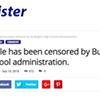

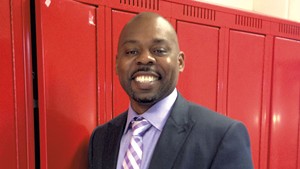
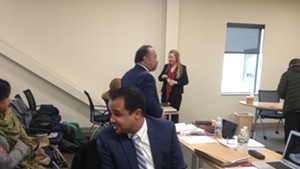

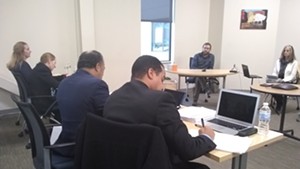





Comments (8)
Showing 1-8 of 8
Comments are closed.
From 2014-2020, Seven Days allowed readers to comment on all stories posted on our website. While we've appreciated the suggestions and insights, right now Seven Days is prioritizing our core mission — producing high-quality, responsible local journalism — over moderating online debates between readers.
To criticize, correct or praise our reporting, please send us a letter to the editor or send us a tip. We’ll check it out and report the results.
Online comments may return when we have better tech tools for managing them. Thanks for reading.